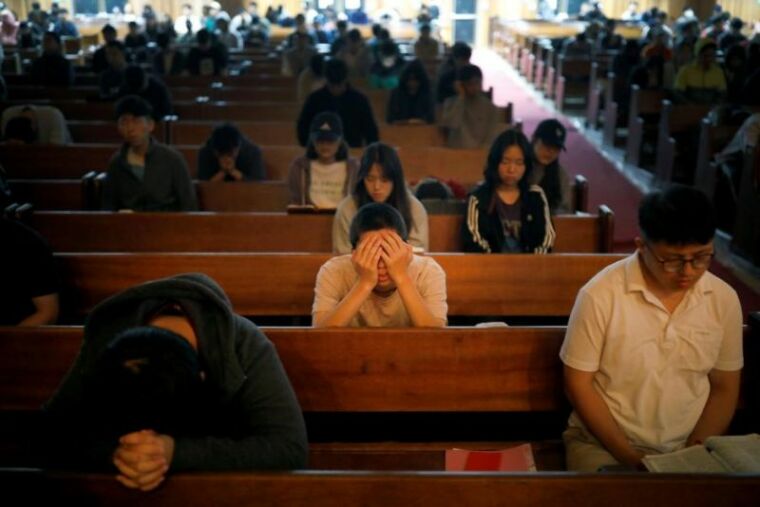Protestant church deemed most unpopular religious institution by South Koreans

A new study has found that the Protestant church is regarded by South Koreans as the most unpopular major religious institution in the country.
The findings of the survey, released by the Korean National Association of Christian Pastors on Thursday, revealed that the approval rating for Protestantism stood at only 9.5 percent, compared to 40.6 for Buddhism and 37.6 percent for Catholicism.
According to The Korea Bizwire, most non-Protestants used words like "selfish," "materialistic," and "authoritarian" when asked to describe their feelings towards Protestants in South Korea.
When the respondents were asked about the challenges facing South Korean churches, 24 percent said "self-interested pastors." Sixteen percent of the respondents said "self-centeredness" and another 16 percent said "focusing far too much on expanding in size."
Previous polls have also shown that South Koreans are becoming more skeptical of Protestantism. A survey conducted by the Christian Ethics Movement in 2014 found that only 20 percent of South Koreans consider Protestant churches to be trustworthy. Around 44 percent said that Protestant churches are not trustworthy while 36 percent said they were ambivalent.
Another study, conducted by Ji&Com Research at the request of the Korean National Association of Christian Pastors, found that less than half of South Koreans believe in religion.
The survey of 5,000 South Koreans aged over 19 revealed that only three in 10 consider themselves religious. Around 20 percent of those who still consider themselves religious identified as Protestants. Around 19 percent identified as Buddhists and about six percent were Catholics.
Statistics Korea, a government body, has found that the share of South Koreans identifying as having no religion has risen from 47 percent in 2005 to 56 percent in 2015.
A poll conducted by Gallup Korea revealed that 31 percent of South Koreans in their 20s considered themselves religious, down from 46 percent a decade earlier.
Experts have attributed the declining numbers to rising youth employment and skepticism. "Young people nowadays are caught in this long cycle of studying hard to get into university, then having to get a good job. They also have technology and many options for leisure activities. All these things have brought young people away from churches," said Andrew Eungi Kim, a professor at Korea University in Seoul.
Kim further explained that South Koreans are becoming less trusting of hierarchical institutions, which leads to their decisions to turn away from religion.
"Young South Koreans are far better educated than their parents and are more likely to be skeptical of the claims religious leaders make," he added.
 Christians don't have to affirm transgenderism, but they can’t express that view at work: tribunal
Christians don't have to affirm transgenderism, but they can’t express that view at work: tribunal Archaeology discovery: Medieval Christian prayer beads found on Holy Island
Archaeology discovery: Medieval Christian prayer beads found on Holy Island Presbyterian Church in America votes to leave National Association of Evangelicals
Presbyterian Church in America votes to leave National Association of Evangelicals Over 50 killed in 'vile and satanic' attack at Nigerian church on Pentecost Sunday
Over 50 killed in 'vile and satanic' attack at Nigerian church on Pentecost Sunday Ukrainian Orthodox Church severs ties with Moscow over Patriarch Kirill's support for Putin's war
Ukrainian Orthodox Church severs ties with Moscow over Patriarch Kirill's support for Putin's war Islamic State kills 20 Nigerian Christians as revenge for US airstrike
Islamic State kills 20 Nigerian Christians as revenge for US airstrike Man who served 33 years in prison for murder leads inmates to Christ
Man who served 33 years in prison for murder leads inmates to Christ


 Nigerian student beaten to death, body burned over ‘blasphemous’ WhatsApp message
Nigerian student beaten to death, body burned over ‘blasphemous’ WhatsApp message 'A new low': World reacts after Hong Kong arrests 90-year-old Cardinal Joseph Zen
'A new low': World reacts after Hong Kong arrests 90-year-old Cardinal Joseph Zen Iran sentences Christian man to 10 years in prison for hosting house church worship gathering
Iran sentences Christian man to 10 years in prison for hosting house church worship gathering French Guyana: Pastor shot dead, church set on fire after meeting delegation of Evangelicals
French Guyana: Pastor shot dead, church set on fire after meeting delegation of Evangelicals ‘Talking Jesus’ report finds only 6% of UK adults identify as practicing Christians
‘Talking Jesus’ report finds only 6% of UK adults identify as practicing Christians Mission Eurasia ministry center blown up in Ukraine, hundreds of Bibles destroyed: 'God will provide'
Mission Eurasia ministry center blown up in Ukraine, hundreds of Bibles destroyed: 'God will provide' Church holds service for first time after ISIS desecrated it 8 years ago
Church holds service for first time after ISIS desecrated it 8 years ago Burger King apologizes for 'offensive campaign' using Jesus' words at the Last Supper
Burger King apologizes for 'offensive campaign' using Jesus' words at the Last Supper Uganda: Muslims abduct teacher, burn him inside mosque for praying in Christ’s name
Uganda: Muslims abduct teacher, burn him inside mosque for praying in Christ’s name